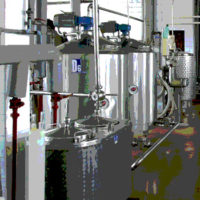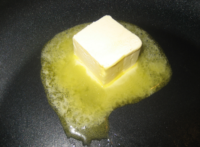The novel coronavirus COVID-19 pandemic has disrupted society in unprecedented ways. As a leading food safety personal protective equipment (PPE) supplier, we are seeing the impact on food manufacturers, suppliers, restaurants, and takeout services across the country, as shopping and dining habits quickly and dramatically shift. The constants that remain steady are safety and prevention of cross-contamination. Best practices in food handling, packaging, preparation, and service are as critical as ever to protecting workers and the public from all forms of potential foodborne illness and exposure—to such dangers as Escherichia coli, norovirus, and Salmonella, among others—and, most importantly, maintaining the reputation of each organization’s brand.
PPE is a phrase used constantly now, mostly commonly in reference to the healthcare sector. The foodservice industry, however, is equally reliant on top-quality, effective PPE including disposable gloves and head-to-toe disposable apparel.
Protecting Workers, Food, and Customers
With more than three decades of focused expertise as a healthcare-based enterprise and food safety solutions innovator, Tronex International, Inc., has a deep understanding of the sanitation and food safety products, best practices, education, and training that must be implemented to help ensure that businesses and their employees are protected from cross-contamination and that they neither contract nor spread foodborne illnesses among themselves, to the food itself, to their work environment, or to their customers.
The impact on the food industry is incredibly varied at this time, but there are many sectors managing increased volume and potential staff challenges in terms of surge hiring or onboarding new staff quickly. As such, it is the perfect time to refresh on the key strategies and best practices to maintain clean facilities and protect against contamination of food, food contact surfaces, and packaging.
Focus on Clean Hands and Sanitized Surfaces
When it comes to food safety, the most critical factor remains risk-based preventive controls, including maintaining clean and sanitized facilities as well as providing workers with the proper PPE for their job function, sourced from suppliers with high-quality standards. This may include disposable gloves and apparel such as bouffant caps, aprons, and beard covers.
Foodservice workers must first practice sound hygiene outside the work environment and adhere to strict handwashing and glove changing protocols at work, as follows:
When to wash hands:
- After arriving at work
- Before handling food, especially ready-to-eat foods like salads and sandwiches
- After touching raw meats, poultry, and fish
- With each change of tasks or switch between handling raw and cooked foods
- After taking off or before putting on a new pair of gloves
- After using the bathroom
- After handling garbage, dirty equipment, soiled dishes or utensils
- After sneezing, coughing, or blowing the nose
- After touching hair, face, or other exposed skin
- After eating or drinking
- After smoking or using electronic nicotine devices
When to change gloves:
- Before handling ready-to-eat foods
- After handling raw meat, seafood, or poultry
- Anytime you switch tasks
- If you have sneezed, coughed, or touched your mouth, nose, hair, or ears
- After going to the bathroom, leaving your workstation, or returning to it
- Occupational Safety and Health Administration standards require that disposable gloves be changed as soon as practical when contaminated and as soon as feasible when they are torn or punctured
The hygiene standards already in place within foodservice operations give the food industry a positive edge in promoting public safety during this moment of heightened concern. Scrupulously maintaining these industry standards and reinforcing the habits that eventually become second nature are of vital importance.
?Food facilities and consumer-facing operations may want to consider a more frequent cleaning and sanitation schedule for high human contact surfaces. Multipurpose latex gloves or heavy-duty nitrile gloves, as well as disposable face masks, fluid-resistant coveralls, and shoe covers, offer added protection for workers handling cleaning solvents and performing tasks in areas that can become wet and slippery, depending on the specific application.
PPE Hand Protection Overview: Which Gloves Are Food Safe?
A range of material formulations provide reliable hand protection in food safety disposable gloves. These include polyethylene (PE), vinyl, latex, and nitrile options. Consider the tasks to be carried out to determine which glove style to utilize for optimal protection:
Poly and new hybrid gloves: Foodservice tasks that require frequent changing, such as sandwich prep or single meal  packaging, can be handled with lightweight PE gloves that offer easy on-and-off. Hybrid PE gloves, such as those offered by Tronex, feature enhanced stretch with innovative grip properties and an overall step-up in durability compared to conventional poly for longer duration of use and a wider range of applications.
packaging, can be handled with lightweight PE gloves that offer easy on-and-off. Hybrid PE gloves, such as those offered by Tronex, feature enhanced stretch with innovative grip properties and an overall step-up in durability compared to conventional poly for longer duration of use and a wider range of applications.
Vinyl gloves: Ideal for handling foods with strong odors, possible irritants like those in jalapeno peppers, or heavier bacterial exposure such as in meats, food-safe vinyl gloves are sturdy and very comfortable.
Latex gloves: If latex allergy is not a concern, gloves made from high-quality, natural rubber latex are an excellent option. They offer an incredibly comfortable “second skin” fit and feel, along with the ability to feel food texture.
Nitrile gloves: For heavy-duty food processing, gloves made with nitrile—a synthetic rubber material demonstrated to be even more durable and chemical resistant than latex—provide reliable protection against oils, chemicals, and temperature extremes. Soft and comfortable, they are perfect for working with raw meats, oily foods, or acidic fruit that might cause breakdown in other glove materials.
Regardless of glove type used, foodservice workers must also practice frequent handwashing and glove changes as outlined above.
Keeping Employees and Cleaning Personnel Healthy and Safe with Quality PPE
The goal of all disposable PPE is to serve as an important first-line defense for personnel in the foodservice, food processing, hospitality, manufacturing, janitorial, sanitation, and other related industries. Specific safety-related practices, including the proper use of PPE, must be implemented, and precautions must be taken to prevent and control foodborne illness and exposure to food contaminants including bacteria, chemicals, and some infectious diseases.
During this unique time, Tronex is proud to offer safety solutions and comprehensive education that promote the following of regulations and safety guidelines to help ensure that cleanliness and hygiene standards are upheld at the highest level across the food industry. The time to refresh our knowledge, staff training, and commitment to safety through education, for our own personal benefit as well as the greater good, is now.
Tronex International, Inc., delivers superior healthcare and safety product solutions on a global scale. With our constantly evolving range of disposable head-to-toe PPE, including a comprehensive line of food-safe and general-purpose gloves that are quality crafted utilizing medical-grade technology in our state-of-the-art ISO-certified and U.S. Food and Drug Administration-registered facilities, we strive to provide the finest quality products and the most trusted service at the best value in the market. Learn more at tronexcompany.com.
This article content has been made available for informational and educational purposes only. Tronex International, Inc. hereby disclaims any and all liability to any party for any direct, indirect, implied, punitive, special, incidental, or other consequential damages arising directly or indirectly from any use of the article content, which is provided as is, and without warranties.




